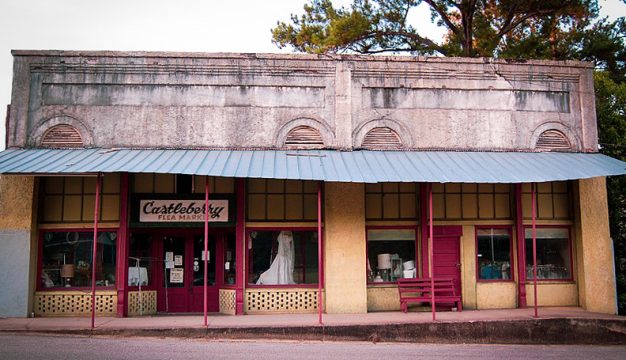Lella Warren
 Lella Warren
During a writing career that spanned more than half of the twentieth century, Lella Warren (1899-1982) wrote novels, short stories, autobiographical essays, and feature stories. Her national, and even international, reputation, however, is based primarily on the success of a single book, Foundation Stone, a historical novel about a family that settled in Alabama in the frontier period of the 1820s. Favorably compared with Gone with the Wind, Foundation Stone was a huge popular success.
Lella Warren
During a writing career that spanned more than half of the twentieth century, Lella Warren (1899-1982) wrote novels, short stories, autobiographical essays, and feature stories. Her national, and even international, reputation, however, is based primarily on the success of a single book, Foundation Stone, a historical novel about a family that settled in Alabama in the frontier period of the 1820s. Favorably compared with Gone with the Wind, Foundation Stone was a huge popular success.
Daughter of physician Benjamin Smart Warren and Lee Ella Underwood, Lella (a contraction of "Lee Ella") Warren was born on March 22, 1899, in Clayton, Barbour County. As a young child, Lella and her family moved with Benjamin Warren to his various assignments as a physician with the United States Marine Hospital Service. When he was assigned to places where he could not take his family members, they returned to Clayton to reside in his mother's home. Lella spent most of her youth in Baltimore and Washington, D.C., graduating from Western High School, in the District of Columbia, in June 1917.
Warren attended Goucher College and George Washington University, receiving a baccalaureate degree from that institution in June 1921. Immediately upon graduation, she married John Spanogle, an engineer. Their daughter, Lee Ella, was born in Washington, D.C., in December 1922.
Warren's professional career began with the publication of A Touch of Earth (1926), a semi-autobiographical novel developed from a story she had written as an undergraduate. The work details the life story of Jill "Jick" Ingle Cheney Kent, the wife of an Army officer, who struggles to become a writer. The novel was successful enough for three printings and a reprint. Ray Long, an editor with Cosmopolitan, admired the novel and contracted with Warren to publish her work in the magazine. During the next decade, Warren published a number of short stories and features and supported herself and her daughter after she divorced Spanogle in 1930. Warren often expressed regret for the time and effort she devoted to these short works, believing that they had distracted her from work on a novel about the "true South" that her father had wanted her to write. Between 1930 and 1935, Warren also worked in government, public relations, and advertising jobs and was a freelance journalist for area newspapers, including The Washington Post, The Washington Star, and The Washington Times-Herald. In 1936, Warren married Gerald Breckenridge, a journalist. After another divorce in 1940, she married Buel W. Patch, an editor with Editorial Research Reports, in August 1941.
At the urging of her father and inspired by Stephen Vincent Benet's narrative poem "John Brown's Body," Warren turned to Alabama and its history for inspiration in her fiction.
She wanted her novels to capture the South of her ancestors, the South of pioneers and the frontier, rather than the South of plantations, magnolias, and mint juleps. She initially planned to develop a trilogy but published only two of the installments of her Alabama epic—Foundation Stone (1940) and Whetstone Walls (1952)—before her death.
Foundation Stone begins the story of the Whetstone family, which leaves a worn-out plantation in South Carolina to settle in Alabama and carve out a new life in the wilderness. The growing Whetstone family prospers in this new land, only to return to its pioneering habits to survive the hardships of the Civil War. Warren spent 14 years doing research for the novel in family records, court documents, and history books. Then she carefully revised the manuscript to provide an accurate and detailed setting for her fictional family.
Foundation Stone was such an immediate popular success that the publisher, Alfred A. Knopf, had to rush three printings before the book was released on September 9, 1940, and it was reprinted 14 times by early in 1941. It also was published that year in Great Britain and translated into Portuguese, Swedish, and Danish later in the 1940s. Widely reviewed in national and local newspapers and in syndicated columns, Warren's book garnered praise for its characterizations, story, and attention to detail. Reviewers most frequently paired Foundation Stone with Gone With the Wind, published only four years earlier, with some critics favoring one and some the other. Their two novels brought Warren and Margaret Mitchell together on several occasions, including the 1941 National Women's Press Club banquet, where they were honored as women of the year. Although the deal was never completed, Hollywood studio magnate David O. Selznick, whose company had produced the film version of Gone with the Wind, reportedly offered as much as $50,000 for the film rights to the novel. When asked about this proposal, Warren explained that she and her agent could not approve some terms of the contract. Speculation is that Selznick was buying the option to keep any film version from competing with his successful adaptation of Margaret Mitchell's novel, released in 1939.
Warren then began work on the second volume of her Alabama trilogy, Whetstone Walls, which took 12 years to complete. This sequel, which takes the Whetstone clan through the years from 1885 to the end of the century, did not live up to the success of Foundation Stone, despite four printings in the first year. Warren continued to write about the Whetstones and completed an unpublished "interlude" manuscript about minor characters in Whetstone Walls entitled "This Nettle Danger." Posthumously published in Family Fiction, "Born Patriarch" is the nonfiction narrative of her father's death, which she planned to rewrite as fiction for the conclusion of the Whetstone saga. Warren never published this final installment and was still working on it when she died of cancer on March 3, 1982.
Works by Lella Warren
A Touch of Earth (1926)
Foundation Stone (1940)
Whetstone Walls (1952)
Family Fiction: Unpublished Narratives of Lella Warren (1989)
Additional Resources
Anderson, Nancy G. "Lella Warren: Alabama's Margaret Mitchell?" Alabama Heritage 7 (Winter 1988): 42-51.
Anderson, Nancy G. "Lella Warren's Literary Gift—Alabama." In Clearings in the Thicket: An Alabama Humanities Reader, edited by Jerry Elijah Brown, pp. 77-88 (Macon, Ga.: Mercer University Press, 1985).
Hughes, Elaine W. "Lella Warren's Use of the Kindermord Motif in Foundation Stone." Alabama English 2 (Spring 1990): 35-40.



